Chapter 1
Introduction — Safeguarding HealthTech through Business Continuity Management
In today's rapidly evolving digital health landscape, continuity is not just a goal—it is a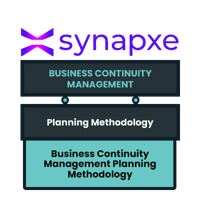 mandate. As healthtech ecosystems like Synapxe grow increasingly complex, interconnected, and essential to national well-being, the risks posed by disruptions—whether technological, environmental, or human-made—can no longer be treated as hypothetical.
mandate. As healthtech ecosystems like Synapxe grow increasingly complex, interconnected, and essential to national well-being, the risks posed by disruptions—whether technological, environmental, or human-made—can no longer be treated as hypothetical.
Instead, they must be strategically anticipated, managed, and mitigated. That is where Business Continuity Management (BCM) comes in.
This eBook, "Ensuring Continuity in HealthTech: Implementing BCM for Synapxe," is a practical guide and strategic framework for embedding resilience into the operations of Synapxe, Singapore's national healthtech agency.
Synapxe is central to powering the nation's public healthcare systems through secure, intelligent digital infrastructure and services. Its critical function in safeguarding public health outcomes means that any disruption to its services can have a widespread impact.
Implementing a tailored BCM program for Synapxe is not simply about compliance or preparedness—it is about ensuring that critical healthcare services remain uninterrupted, even in the face of adversity.
Whether protecting patient data, maintaining telehealth services, or facilitating seamless communication across medical institutions, continuity planning lays the foundation for trust in the healthcare system.
This book is divided into two main sections:
eBook 1: Understanding Your Organisation
 As you would have read in eBook 1, this first section lays the groundwork for continuity planning by thoroughly examining Synapxe’s internal and external environments.
As you would have read in eBook 1, this first section lays the groundwork for continuity planning by thoroughly examining Synapxe’s internal and external environments.
It introduces BCM concepts specific to the healthtech context and moves into a comprehensive organisational analysis.
Key focus areas include understanding Synapxe’s operational landscape, setting business continuity goals, identifying assumptions and risks, defining critical business functions, and establishing a dedicated BCM team.
This foundational understanding ensures that the BCM strategies developed are precise, relevant, and aligned with the organisation's unique mission and challenges.
eBook 2: Implementing Business Continuity Management for Synapxe
Building on the foundational insights from eBook 1, this second section provides a structured methodology for implementing BCM within Synapxe. This methodology is adapted to the unique needs of a national healthtech agency and encompasses seven interrelated phases:
 Project Management (PM): Initiating and managing the continuity project with clear scope and governance.
Project Management (PM): Initiating and managing the continuity project with clear scope and governance.- Risk Analysis and Review (RAR): Identifying internal and external threats that could impact operations.
- Business Impact Analysis (BIA): Determining the potential effects of disruptions on critical functions.
- Business Continuity Strategy (BCS): Designing strategies to maintain or recover operations.
- Plan Development (PD): Documenting the continuity plans and procedures.
- Testing and Exercising (TE): Verifying the effectiveness of the plan
- Program Management (PgM): Establishing governance for long-term BCM maintenance and improvement.
Each phase is designed to prepare Synapxe for potential disruptions and embed resilience into the organisation’s DNA.
This eBook is intended for health tech leaders, operations managers, IT professionals, risk officers, and all stakeholders within Synapxe responsible for safeguarding continuity.
By aligning business continuity strategies with Synapxe’s core values and national healthcare objectives, this guide empowers the organisation to respond to change, not just survive it, but adapt and thrive.
As we embark on this journey through continuity planning, let us remember that in healthcare, every second counts, and every disruption averted means potentially saved lives. Continuity is more than resilience—it is responsibility.
Summing Up …
Understanding the organisation is the cornerstone of any successful BCM initiative. In this chapter, we have examined Synapxe’s operational structure, mission, and critical services and aligned these with business continuity goals.
We have identified the internal assumptions and external risks that must be factored into planning and explored how to form a capable, cross-functional BCM team to lead the effort.
By building a deep understanding of Synapxe before implementing continuity strategies, we lay the groundwork for a relevant and resilient BCM program. This chapter provides the essential context for the planning methodology presented in the next section.
With this foundational knowledge, the reader is now prepared to move from understanding to action—applying BCM principles through a systematic, phased approach tailored to Synapxe’s healthtech mission.





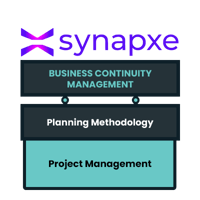
![[BCM] [SY] [E2] [C3] Risk Analysis and Review](https://no-cache.hubspot.com/cta/default/3893111/f8dd9bb1-46ff-4350-a02f-584381792f2b.png)
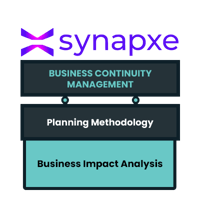
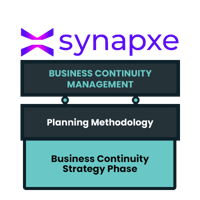
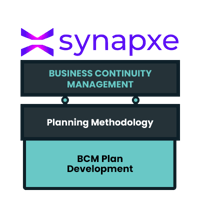
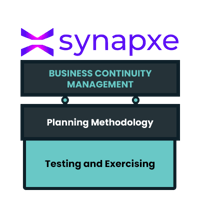
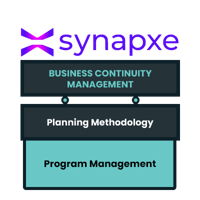
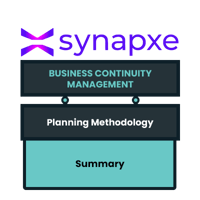
![[BCM] [SY] [E2] [C10] [Back Cover] for eBook 2](https://no-cache.hubspot.com/cta/default/3893111/64fbdfb0-7e49-43cb-9402-42b384bed4fd.png)


![Register [BL-B-3]*](https://no-cache.hubspot.com/cta/default/3893111/ac6cf073-4cdd-4541-91ed-889f731d5076.png)



![FAQ [BL-B-3]](https://no-cache.hubspot.com/cta/default/3893111/b3824ba1-7aa1-4eb6-bef8-94f57121c5ae.png)
![Email to Sales Team [BCM Institute]](https://no-cache.hubspot.com/cta/default/3893111/3c53daeb-2836-4843-b0e0-645baee2ab9e.png)





